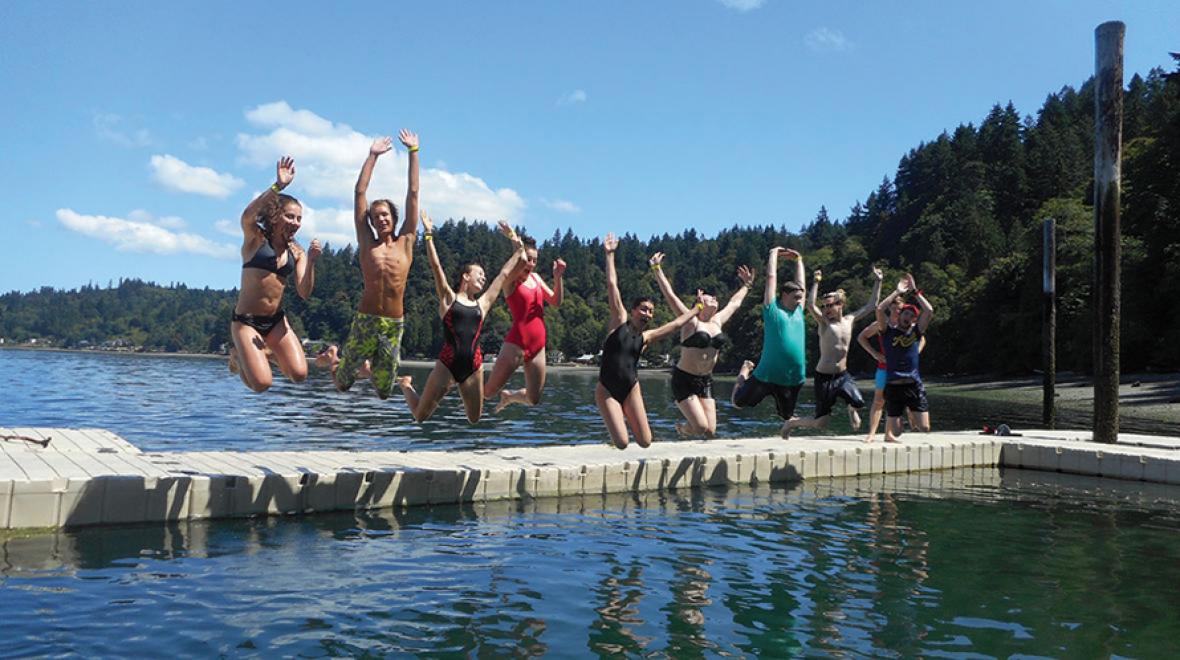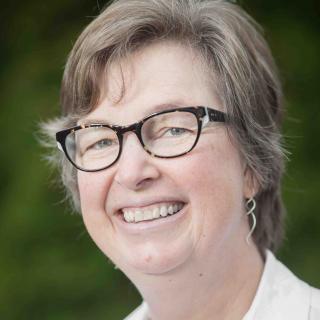
Photo:
Making a splash Photo credit: Camp Sealth
It’s an only-in-Seattle scene. Two hundred or so sleepy yet nervous families gather at about 6:30 a.m. on the downtown waterfront and load kids and luggage onto an Argosy vessel. After waving good-byes to their families, the kids take a raucous two-hour journey full of songs and games, heading for a week at Camp Sealth, on Vashon Island.
The vessel for this journey is named Da Boata. The captain, who has led most of these journeys since the early 1980s, is called “Mooselips.” Camp is a place where nicknames thrive, and at Camp Sealth, they are particularly popular.
The camp’s director, Carrie Lawson, says that by the time the boat returns with the kids a week later, the young campers have gained skills that will serve them through life, all while having a wonderful time.
“Camp is a phenomenal experience,” she says.
Sleepaway smarts
When are kids ready for an overnight camping experience? It depends on the child.
“I think kids who are ready to camp will exhibit independence in other areas,” Lawson says. If they manage events such as sleepovers well, that’s a sign they might enjoy overnight camp. And of course, they should want to go.
“I like to say the first thing is to get them involved in the decision making,” Lawson says. “Ask what they want, if there are specific activities.”
Parents can help kids get ready by showing them photos and videos of camps, telling them what it involves and perhaps even visiting a site. Like many other camps, Camp Sealth has several open houses and tour days before camp gets started, so families can become familiar with it.
Other camps, such as Camp Orkila and Camp Colman, have family camps in the springtime that can introduce kids and families to the fun of overnight camp.
“I think it’s important for kids to know where they are going,” Lawson said.
Final prep
Another tip for parents of first-time campers: Keep the enthusiasm level high. Sometimes kids who sincerely want to go to camp will become fearful in the days leading up to departure, says Kim Brunskill, director of Camp River Ranch, a Girl Scout camp near Carnation.
“In order to set up our kids for success, we ask our parents to let them know they can do it, and they are looking forward to the stories,” Brunskill says.

It is important to communicate with the staff about your child’s quirks and needs.
Parents should tell staff about “any particular challenges a camper faces in terms of relating to other people, [and] whether their challenge has a diagnosable name or not,” Brunskill says. Provided they have a heads-up, staff members are ready to discreetly help kids with all kinds of issues.
One example: bedwetting. Bedwetting is common — one study estimates that about one in 20 10-year-olds sometimes wets the bed — and it should not be an obstacle to attending camp. However, parents need to tell staff, and to tell their campers that staff are ready to help them.
An informed counselor can help a camper change and wash bedding and clothes without anyone in the neighboring bunks noticing, Brunskill says.
Buddy up?
Sometimes it’s helpful for a first-time camper to go with a buddy, but parents should be careful about that strategy.
“Sometimes we have kids that want to come with a big group of friends, and I would discourage that,” Lawson says. A major goal of summer camp, after all, is to make new friends.
Also, while siblings can be at camp at the same time, she recommends they sleep in different cabins.
“In general, siblings do better when separated,” she says.
Decisions, decisions
The American Camp Association accredits camps if they meet certain health and safety standards. If the camp you are considering isn’t accredited — and many small and specialty camps aren’t — you should do extra research on its facilities and talk to families that have had kids attend the camp.
Depending on your child’s interest, you might want to choose a general-interest camp or a specialty camp, such as horse camp, marine science camp, kayaking camp, sports camp, arts camp or a camp focusing on some other interest. Camp Sealth even has a construction camp.
A few specialty camps bear more resemblance to summer boarding schools than to conventional camps — long on academic instruction, short on nicknames, songs and “capture the flag.”
Again, it depends on your child’s interests. Some kids can’t get enough of campfire skits and cabin-cleaning contests. Others just want to retreat somewhere and work on their music or their skills.
Classic camp
Brunskill is a lifelong believer in the inclusive fun of old-school camp, with its games, crafts, outdoor activities and campfire songs.
“There’s a lot to be said for a traditional camp, doing arts and crafts, having the opportunity to meet new people and staff and experience something different from your home life and your school life,” says Brunskill.
One thing is certain: The kids who come back after camp are not quite the same as the kids who left a week earlier. They’ve gained new confidence, skills and far-flung friends. Maybe your son or daughter will be sporting nail polish or practicing a new repertoire of jokes.
Lawson feels privileged to watch that transformation happen year after year, she says.
“I enjoy watching the youth grow up through our program and seeing the incredible young adults they become.”
Sleepaway camp samplerHere is a taste of the variety of overnight camps that serve Puget Sound kids. The big onesIf you are looking for a big camp with a full array of facilities and generations of fans, there are many options. The YMCA runs Camp Orkila, Camp Colman and Camp Seymour. Camp Fire Central Puget Sound runs Camp Sealth, and the Girl Scouts of Western Washington runs camps for girls at Camp River Ranch, Camp Robbinswold and Camp St. Albans. Each of these camps is focused on the traditional camp experience, but each also offers specialty programs, from the mainstream (riding horses) to the offbeat (a nocturnal camp). Traditional but smallFor those looking for a more intimate camp experience, there are a number of idyllic options, each with a serious following. Hidden Valley Camp, near Granite Falls, is a small camp nestled on a lakefront property that offers riding and other camp activities. Camp Four Winds Westward Ho, on Orcas Island, is heavy on traditions, including uniforms — shorts for boys and bloomers for girls. Older campers (ages 9–15) attend for four-week sessions. Camp Gallagher, on Case Inlet, offers programs for middle schoolers and high schoolers. Teen campers have the opportunity to shape their own days — including deciding when they will wake up in the morning. Sports and specialty campsFor kids who want to immerse themselves in a specific interest, there are many options. For soccer, Peter Fewing, a Seattle University coach, runs overnight camps with his trademark relentless enthusiasm. Those more interested in the arts should consider the theater, filmmaking, piano and symphony camps at Icicle Creek Center for the Arts in the Leavenworth area. Kids with an interest in outdoor adventure and survival skills should look at Wilderness Awareness School. And if your child’s ambition is to learn French, Washington boasts one of the best places in the U.S. to do that. Canoe Island French Camp, on a 47-acre island southeast of Shaw Island in the San Juans, imports half of its counselors from France. Camp Ten Trees runs camps for LGBTQ kids and families, offering a wide spectrum of activities, with an emphasis on waterfront activities and archery. |
Editor’s note: This article was originally published in January 2017, and updated in February 2019.











